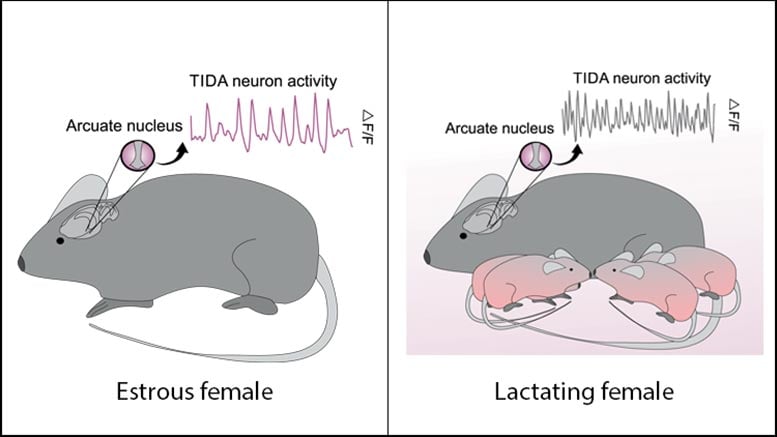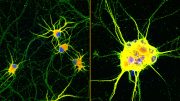
The membrane voltage of TIDA neurons oscillates more during lactation (right). Credit: Thörn Pérez et al., JNeurosci 2020
Prolactin-controlling neurons in mice undergo reversible changes in how neurons communicate.
Lactation temporarily changes how a mother’s neurons behave, according to new research in mice published in JNeurosci.
Mothers experience profound changes in their bodies after giving birth, many of which are controlled by the hormone prolactin. Neurons in the hypothalamus called TIDA neurons regulate prolactin secretion as it fluctuates during the estrous cycle. However, during lactation, the TIDA neurons stop keeping prolactin levels in check, teasing the possibility that they may be altering their properties in response to motherhood.
Thörn Pérez et al. examined the electrical behavior of TIDA neurons in mice both during lactation and throughout the estrous cycle. In order to regulate prolactin, the voltage of TIDA neurons oscillates up and down: when the cell voltage is less negative, it fires more often, while a more negative cell fires less often. The scientists observed that the cell voltage oscillates more frequently during lactation, meaning it fires more often overall. They also fire out of rhythm with each other. These changes are fully reversible — the cells return to normal when the moms start weaning. During all stages of the estrous cycle, the neurons behaved normally, meaning the neurons change because of motherhood, rather than prolactin levels.
Reference: “Manuscript title: Adaptive Resetting of Tuberoinfundibular Dopamine (TIDA) Network Activity During Lactation in Mice” by Carolina Thörn Pérez, Jimena Ferraris, Josina Anna van Lunteren, Arash Hellysaz, María Jesús Iglesias and Christian Broberger, 24 March 2020, JNeurosci.
DOI: 10.1523/JNEUROSCI.1553-18.2020









Be the first to comment on "Lactation Changes Electrical Signaling in Mom’s Brain – But It’s Reversible"